 Surprisingly, there has so far been little study to use Charles Collins’s work on paper as the basis of critical discussion, and nothing which takes it as a primary point of focus apart from a single chapter which reported that Collins was ‘distinguished alike as artist and author,’ a gentle, shy and sensitive person perhaps unfairly consigned to oblivion, has little to say of an analytical nature. Continue reading “No. 20: Charles Allston Collins at 40”
Surprisingly, there has so far been little study to use Charles Collins’s work on paper as the basis of critical discussion, and nothing which takes it as a primary point of focus apart from a single chapter which reported that Collins was ‘distinguished alike as artist and author,’ a gentle, shy and sensitive person perhaps unfairly consigned to oblivion, has little to say of an analytical nature. Continue reading “No. 20: Charles Allston Collins at 40”
No. 19: James Joyce at 40
 Tomorrow – 16 June – is Bloomsday, an annual international celebration of Joyce’s most famous work Ulysses. The significance of the date is that is the day in which the action of Ulysses is set, yet an equally important date for Ulysses – i.e. its first publication as a novel – is, would you believe, his 40th birthday on 2 February 1922. Continue reading “No. 19: James Joyce at 40”
Tomorrow – 16 June – is Bloomsday, an annual international celebration of Joyce’s most famous work Ulysses. The significance of the date is that is the day in which the action of Ulysses is set, yet an equally important date for Ulysses – i.e. its first publication as a novel – is, would you believe, his 40th birthday on 2 February 1922. Continue reading “No. 19: James Joyce at 40”
No. 18: Christopher Marlowe (not) at 40
 A number of posts in this series have looked upon authors in their 40th as either just beginning their career, or safely in the midst of it, but just as often we can see 40 as an elusive, unobtainable age, and such is certainly the case for Christopher Marlowe who died in 1593 aged just 29; yet he still maintained a presence on the stage in his 40th year, with the first publication of his most famous play Doctor Faustus eleven years after his death. Yet Marlowe’s early death has also been the making of his reputation, with fans and critics alike bewailing the absence of further plays and regularly arguing that had he lived, be it 40 or older, it might have been him, and not Shakespeare, who we study today. Continue reading “No. 18: Christopher Marlowe (not) at 40”
A number of posts in this series have looked upon authors in their 40th as either just beginning their career, or safely in the midst of it, but just as often we can see 40 as an elusive, unobtainable age, and such is certainly the case for Christopher Marlowe who died in 1593 aged just 29; yet he still maintained a presence on the stage in his 40th year, with the first publication of his most famous play Doctor Faustus eleven years after his death. Yet Marlowe’s early death has also been the making of his reputation, with fans and critics alike bewailing the absence of further plays and regularly arguing that had he lived, be it 40 or older, it might have been him, and not Shakespeare, who we study today. Continue reading “No. 18: Christopher Marlowe (not) at 40”
No. 17: C. S. Lewis at 40
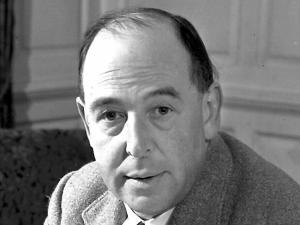 Born in 1898, Clive Staples Lewis turned 40 in 1938. With a name like that it’s no wonder before he was four he’d already defiantly demanded to be known as Jack, and of course we know him better today by his initials, CS. Continue reading “No. 17: C. S. Lewis at 40”
Born in 1898, Clive Staples Lewis turned 40 in 1938. With a name like that it’s no wonder before he was four he’d already defiantly demanded to be known as Jack, and of course we know him better today by his initials, CS. Continue reading “No. 17: C. S. Lewis at 40”
No. 16: H G Wells at 40
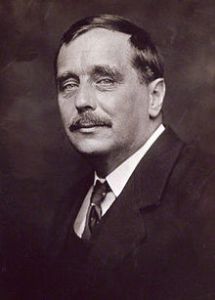 Born in 1866, H G Wells turned 40 in 1906. By this time some of his most famous works of science fiction had been written, but rather than rest on his laurels Wells was working hard at a wider range of literature and social commentary. Continue reading “No. 16: H G Wells at 40”
Born in 1866, H G Wells turned 40 in 1906. By this time some of his most famous works of science fiction had been written, but rather than rest on his laurels Wells was working hard at a wider range of literature and social commentary. Continue reading “No. 16: H G Wells at 40”
No. 15: Alexander Pope at 40

Alexander Pope (1688-1744) turned 40 on 21 May 1728, just four days after the first part of his mock epic The Dunciad was published. For all its technical brilliance and customary multitude of levels at which it can be read, the poem was the latest salvo in a longstanding feud, partly in response to attacks on Pope’s 1725 edition of the complete works of Shakespeare (the second edition of which was published in 1728 also).
Lewis Theobald, who also edited Shakespeare in the Eighteenth Century, had been critical of Pope’s edition in a review, for which he wound up as the hero ‘Tibbald’ of Pope’s Dunciad. Pope published the first part of this poem anonymously in May 1728, though it was widely recognised as Pope’s work. It followed another work published the year before, to which Pope had put his name, The Art of Sinking in Poetry, in which he once again attacked his critics and rival poets. In The Dunciad he widens his attack to take in the whole of society, with his description of a kingdom of dullness, led by Dunce I (George I) and Dunce II (George II).
 If Pope thought he had been under attack before, the publication of The Dunciad only exacerbated the situation, to which Pope in turn responded with further volumes of the poem appearing in 1729, 1742 and 1743. Such was the level of scorn put upon him by his detractors for this scandalous work that he was said to only leave the house and walk in public if accompanied by his great dane and with two pistols on his person. For in addition to being a response to personal attacks, it was also part of a wider campaign to attack the Whig government, led by the unpopular Walpole, whom Pope himself had been in close contacts with. In attacking the government he was aided by fellow members of the Scriblerus Club – a collection of wits seeking to mock high writing, and the Whigs in the process, and including among their number the three Johns: John Gay, Jonathan Swift and John Arbuthnot. Together they showed the power of the pen as a political tool, writing pointed satires to highlight the folly of those in charge.
If Pope thought he had been under attack before, the publication of The Dunciad only exacerbated the situation, to which Pope in turn responded with further volumes of the poem appearing in 1729, 1742 and 1743. Such was the level of scorn put upon him by his detractors for this scandalous work that he was said to only leave the house and walk in public if accompanied by his great dane and with two pistols on his person. For in addition to being a response to personal attacks, it was also part of a wider campaign to attack the Whig government, led by the unpopular Walpole, whom Pope himself had been in close contacts with. In attacking the government he was aided by fellow members of the Scriblerus Club – a collection of wits seeking to mock high writing, and the Whigs in the process, and including among their number the three Johns: John Gay, Jonathan Swift and John Arbuthnot. Together they showed the power of the pen as a political tool, writing pointed satires to highlight the folly of those in charge.

The impression one gets of Pope from all of the above is of a writer highly political, devious, and with an axe to grind, but neither was he short of friends. He never married, and at age 40 was living in Twickenham with his widowed mother Edith. Pope himself suffered from ill health, developing what may have been tuberculosis (an exact diagnosis has not been agreed upon by scholars) which caused a curvature of his spine – something Pope himself put down to too much study. Thus behind the fiery satirist lay a vulnerable, caring character. At 40 years old he had already achieved a great deal – in addition to his edition of Shakespeare, he had also translated Homer’s Iliad and Odyssey, not to mention his own masterpiece The Rape of the Lock. But nor was he slowing down either, with a great many more works still to come before his death aged 66. For Pope, 40 was right in the middle of his stride.
Pope and Buckingham: Pope is a key figure in the Restoration and Augustan Literature module, with his mock-epic poem The Rape of the Lock being a set text.
No. 14: Elizabeth Gaskell at 40
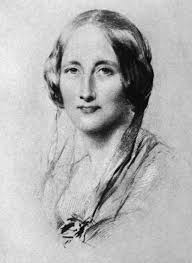 Elizabeth Cleghorn (I kid you not) Gaskell turned 40 on 29 September 1850; in one sense this was the latter part of her life (she was only 15 years away from her death), yet at the same time, her life as a writer was only just beginning. Her first novel, Mary Barton, had been published just two years before, and the great works for which she would be long remembered still lay ahead of her. Continue reading “No. 14: Elizabeth Gaskell at 40”
Elizabeth Cleghorn (I kid you not) Gaskell turned 40 on 29 September 1850; in one sense this was the latter part of her life (she was only 15 years away from her death), yet at the same time, her life as a writer was only just beginning. Her first novel, Mary Barton, had been published just two years before, and the great works for which she would be long remembered still lay ahead of her. Continue reading “No. 14: Elizabeth Gaskell at 40”
No. 13: J K Rowling at 40

Born 31 July 1965, for J K Rowling her 40th birthday in 2005 was very much a time when she was at the peak of her powers, with the sixth of the seven books just published two weeks earlier to a frenzy of media attention and Potter-mania in full flow. By now the fairy tale rags-to-riches narrative of Rowling as an author seemed to be very much in the happy ever after phase as her work dominated the book chart. Continue reading “No. 13: J K Rowling at 40”
No 12: Anton Chekhov at 40
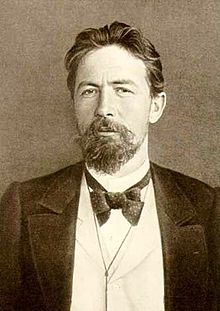 So far in this series we have seen some writers who are winding down at 40, others who were already dead at 40, or others yet who were still developing their craft at 40. But in the case of Anton Chekov, born 29 January 1860 and therefore turned 40 in 1900, 40 is in many ways the moment: the time for which he is remembered, for it is around this age that he wrote his most successful plays that were to secure his legacy. Continue reading “No 12: Anton Chekhov at 40”
So far in this series we have seen some writers who are winding down at 40, others who were already dead at 40, or others yet who were still developing their craft at 40. But in the case of Anton Chekov, born 29 January 1860 and therefore turned 40 in 1900, 40 is in many ways the moment: the time for which he is remembered, for it is around this age that he wrote his most successful plays that were to secure his legacy. Continue reading “No 12: Anton Chekhov at 40”
No. 11: Leigh Hunt at 40
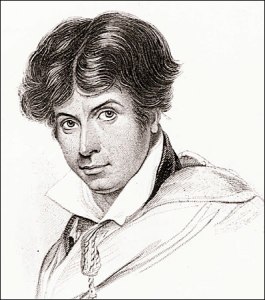 ‘It is often necessary for a good journalist to write bad literature. It is sometimes the first duty of a good man to write it’ G.K. Chesterton once wrote, in a brief introduction to a collection of Charles Dickens’s journalism. He expresses in characteristically pithy fashion a central problem with literary journalism and its interactions both with the outside world, and with the world of art. Few writers grappled with this problem more resolutely than James Henry Leigh Hunt (1784-1859), who is an important and unjustly neglected figure both in nineteenth-century press history and in our literary history. Continue reading “No. 11: Leigh Hunt at 40”
‘It is often necessary for a good journalist to write bad literature. It is sometimes the first duty of a good man to write it’ G.K. Chesterton once wrote, in a brief introduction to a collection of Charles Dickens’s journalism. He expresses in characteristically pithy fashion a central problem with literary journalism and its interactions both with the outside world, and with the world of art. Few writers grappled with this problem more resolutely than James Henry Leigh Hunt (1784-1859), who is an important and unjustly neglected figure both in nineteenth-century press history and in our literary history. Continue reading “No. 11: Leigh Hunt at 40”